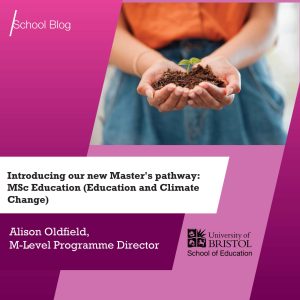 By Dr Alison Oldfield, MSc Programme Director, School of Education
By Dr Alison Oldfield, MSc Programme Director, School of Education
We live in a time that is increasingly affected by the complex issue of climate change and what it means to live, work, and learn in a warming world. The implications of a warming climate are now regularly felt across the world and often in unequal and unjust ways. These changes bring with them questions about the role of education in shaping and addressing how we individually and collectively respond to and thrive on a warming planet. In recognition of this, the School of Education has developed a new pathway to add to its current master’s programmes, and this is now recruiting for its first class of students to start in September 2023.
A new pathway for SoE masters students
The MSc Education and Climate Change pathway aims to enable students to develop an understanding of the multifaceted causes and consequences of globally disruptive environmental changes facing individuals and societies. This new pathway will support students to develop meaningful personal and professional responses to climate change by recognising the interdisciplinarity of the issue of climate change and education.
It will do this by adopting a ‘head, heart, and hands’ approach. This means that the pathway aims to support critical analysis and exploration of the complex relationship of climate change and education through different theoretical lenses and with an emphasis on issues of climate justice – while at the same time recognizing the need for emotional and affective strategies for collective responses and hands-on opportunities for practical educational research and action.
These priorities are woven through the programme, which is a mixture of taught units and a student-led dissertation research project. Through four core units, students will explore how climate change impacts assumptions about the future and changes ideas about the purpose of education, be supported to develop meaningful responses to climate change through collective inquiry and action, and build professional capacities to create sustainable futures through critical reflection and action research projects.
In addition to the core units, students will be able to take 60 credits of available optional units to pursue related interests or to dive deeper into related contemporary global challenges. After completing the taught units, students undertake a dissertation project focused on their own areas of interest, with support from a supervisor.
Developing partnerships
We also recognize that tackling the challenges posed by life on a warming planet cannot be an individual venture. So, we are also delighted to be developing partnerships with amazing organizations in relation to this programme – these include Black Mountains College, the pioneering new university that has just launched to create a radically new approach to further, higher and public education in the age of climate change; the Global Goals Centre, which is creating a vibrant new public space in Bristol where visitors can explore what a greener, fairer and creative future might look like; and Windmill Hill City Farm, one of the oldest city farms in the country and a place that demonstrates practical examples of locally-led climate justice, concerned with people, land and food.
We hope to work with these partners to create opportunities for students to learn from and contribute to their work and aim to offer our students a first-hand experience of world-leading climate education in formal, informal, and public settings and opportunities to develop skills across a range of education-related sectors.
Furthermore, the pathway will draw upon and engage with a wealth of current research in this field taking place in the School of Education, including the Climate Change Education Research Network, Transforming Education for Sustainable Futures, the Green Apple teacher education initiative, among others. The pathway is led in teaching and pastoral support by Professor Keri Facer, Professor Alf Coles, and Dr Alison Oldfield and will be supported by other colleagues across the school who are engaged with and deeply care about this area of education.
Welcoming our first cohort
We anticipate that students on the programme will come from a range of backgrounds and experiences and from across educational and environmental sectors, including schools, educational policy makers, informal learning providers, and non-profit and non-governmental organisations. We very much look forward to welcoming our first cohort of students to the School of Education and to Bristol in September 2023.
Applications are now open and we are more than happy to answer any questions interested applicants may have – please email Professor Keri Facer with any inquiries.
School of Education MSc Education (Education and Climate Change) pathway
For more information about the MSc Education (Education and Climate Change) pathway at the School of Education, University of Bristol, please visit our prospectus pages.
